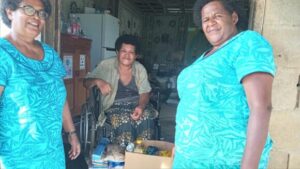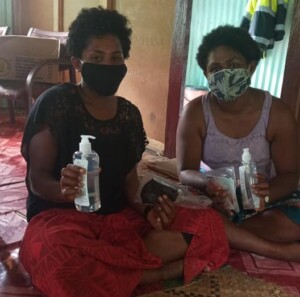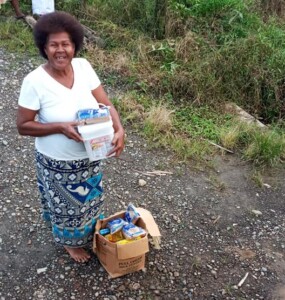Women’s dairy group shares their COVID-19 reality
August 21, 2021
By Shyana Ali and Roshni Chand

Food ration deliveries to 200 households in Naitasiri
“When the announcement came, I quickly advised the women of my group to prepare enough food to last their families two weeks under lockdown. I didn’t know then that it would be nothing like last year’s COVID-19 experience and that we would be cut off from everything for months.”
Seruwaia Kabukabu, a smallholder dairy farmer and Secretary of the Naitasiri Women in Dairy Group (NWDG) shares some of the hardships that her members have faced since Fiji began its second battle with the coronavirus in April.
Seruwaia lives in a rural farming community in Naitasiri, a three-hour drive (35km) from Suva. Usually, a self-sufficient and thriving women’s group, the NWDG began to feel the impacts of the pandemic when their community was placed under restricted movement through government-imposed containment zones. The zones are separated by borders meant to contain the spread of the virus, but this consequently had implications on the NWDG’s livelihoods, food security and social wellbeing.
Adapting to life under COVID-19 restrictions
“These borders instantly cut us off from access to markets, and we have had very little support from some government ministries that we rely on. This caused a 50 percent drop in our main source of income as we could not purchase many of the important farming implements, we needed.”
Seruwaia says that the delayed supply of imported calf milk feed caused a significant drop in milk supply. The women had to make the hard decision to sacrifice half their income to ensure that the calves would survive through the pandemic by allowing them to suckle from milking cows. To make matters worse, the women’s other source of income was slowly drying up.
Initially, the NWDG could still sell some of their oyster mushrooms through the support of Marlene Dutta and Talanoa Treks Director Marita Manley who would meet them at the Sawani border to collect their produce. This was sold to their customers in Suva and income was transferred to each member’s M-PAiSA mobile wallets. With the borders still closed in August, the mushrooms have since dried out as the women have not been able to source new substrates needed to grow new mushrooms.
The community has now resorted to planting cash crops, cassava and taro which they try to sell at the border. This too though is no easy feat; the women must leave their homes as early as 4 am on the back of a truck to arrive at the border for early trading. The truck costs $100 per way and this sometimes means they end up owing truck drivers more than the actual money they have made. Because the border market trading point is not an official setup marketplace, the women struggle to store, trade and maintain good quality of fresh produce. They are also exposed to the elements and do not have access to washrooms.
Concerned with the safety and well-being of the women, Marita also lobbied for the support of businesses in Suva to help source donations of hand sanitizers from Mue Bentley and discounts on the purchase of reusable masks from Stella Tiko. Both women are members of the Women Entrepreneurs Business Council, another grantee of the Fund. Marlene Dutta also provided sanitary pads for the women.
 Communications and COVID-19 information challenges
Communications and COVID-19 information challenges
Access to accurate and timely information has been a challenge, especially for the NWDG.
Seruwaia says that in the initial weeks of the lockdown, she found it difficult to relay information to her members who are spread across Naitasiri. She had to come up with innovative ways to ensure that COVID-19 related information and national announcements were reaching her members.
“Usually, our members communicate and access information through our Facebook group, Viber, text messaging, and phone calls but many of our members have had to prioritise spending their meager incomes on food for their families instead of buying data and talktime. With the restrictions in place, I had to find ways to get information to them. I used the milk collector to transfer messages to all our members. I would write notes, put the farm number on the note and when he picked up their milk from chillers near their homes, he would help deliver my messages,” said Seruwaia.
On some occasions, Seruwaia had no choice but to purchase talktime to call her members and if there were network issues, she would make a trip to their farms, standing safely at a distance to relay messages and government announcements.
While Naitasiri has been classed a green zone (low risk community) due to the border, the women have tried to ensure COVID-safe protocols are maintained and that everything is done within their family bubbles.
Strained government assistance
Before the COVID-19 crisis, the NWDG and its communities benefited and relied heavily on the support of Government assistance through the Ministry of Agriculture (MoA). However, with the Government reorienting resources to COVID-response, assistance from the MoA over the past three months has significantly decreased.
MoA personnel in the Naitasiri area have been redirected to work with the Ministry of Health aiding with COVID-19 swabbing and vaccinations, which has resulted in farmers having to rely on each other.
“Previously MoA would assist farmers with veterinary services, calf delivery and seedlings, but now farmers must call each for help with these matters. Many of us don’t have the expertise or knowledge to birth cows so it has really been a struggle for our community. We are also not able to access seeds and other farming support,” said Seruwaia.
Being future-focused, the NWDG and its communities are now exploring other sources of income by bartering seedlings amongst neigbouring farms for cash-crop production.
Women carry extra burden
With schools closed since 22 April 2021, women in the NWDG community have now taken on the extra burden of being mothers, entrepreneurs, farmers, teachers, chefs, and caregivers. Some of them have raised that they feel exhausted and that they have had to speak to their husbands about taking on some of the duties like helping their children with schoolwork.
With the loss of their ‘solesolevaki’ (shared workload and social equity) approach due to restricted gatherings, the NWDG has established member’s wellbeing checks via phone calls. However, this does not work for all the members who say that they cannot be open or speak freely as they are being listened to by family members in their household.
 Support from the Fiji Women’s Fund
Support from the Fiji Women’s Fund
With little to no assistance reaching their communities, the NWDG turned to the Fiji Women’s Fund for help. The NWDG has been a grantee of the Fund since 2018 and they were able to reallocate close to FJD $7,000 from an existing grant to support their community with food rations for 200 households. Those supported also included non-NWDG members such as single mothers and persons living with disabilities. This funding also supported the NWDG with their vaccination drive which led to over 200 people being vaccinated.
Seruwaia said if not for the support of the Australian Government through the Fund and its grantee partners, her community would have surely been left to fend for themselves.
“We are grateful for the ongoing support of the Fund and the many wonderful women who have come to our aid in our time of need.”
Recent Whats New
Resilience and Sustainability in Action
October 28 2025
Nalini Singh Calls for Collective Feminist Resilience
October 28 2025
